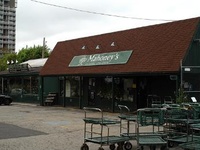As they lobby the councillors, Carlson says he and the other activists hope to take advantage of the timing of the upcoming November election.
He also says he feels the University has learned from their mistakes in Riverside and tried to involve the Agassiz residents more and earlier in the planning process. But he stressed that the two communities are very different.
“We care about the riverfront, and Harvard just wants to take it over and make it a little stream that goes through campus,” he says. “That is what makes the battle so different from any other one. It makes it more of a citywide issue.”
Sullivan says the Riverside neighborhood’s resistance to Harvard expansion comes from a history of unpopular construction in the area—including Peabody Terrace and Mather House—but that Harvard’s current plans will not be as invasive.
“No one wants to replicate Peabody Terrace. It was a mistake when it was built in the sixties,” says Sullivan, a third-generation city politician who says he grew up in Cambridge “in the shadows of Mather being constructed.”
Moving On
In other parts of the city, one high-profile conflict came to an end this year, while another faded into the past.
In January, Stone announced that the University would go forward with plans to build the Center for Government and International Studies (CGIS) in Mid-Cambridge, one of FAS’s top priorities—without the tunnel connecting the two buildings, the lone part of the project that required city council approval.
From the time the project was announced over five years ago, residents objected to the buildings’ size and height, but they could not stop Harvard from building on its own property.
Instead, they lobbied local politicians to block Harvard from digging a tunnel under busy Cambridge Street, a construction project that they said would disrupt the entire neighborhood.
In the spring of 2002, the city council voted to create a committee made up of local activists, Harvard officials and city representatives to try to hammer out a compromise.
Stone personally attended the negotiating sessions and offered unprecedented concessions to the neighborhood, including a $1 million parcel of land to be used for a park, $300,000 for neighborhood projects and a five-year moratorium on local construction.
But Harvard would not discuss the size and use of the buildings, which was the neighborhood’s main concern, and the compromise fell apart over the summer.
The city council put forth its own proposal in October, which doubled the amount of money and the length of the moratorium and included a provision that the University would need neighborhood approval for any future development.
By January, though, Harvard officials decided they could not meet these terms.
Read more in News
Pataki: 'Yale is Going to Crush Harvard'














